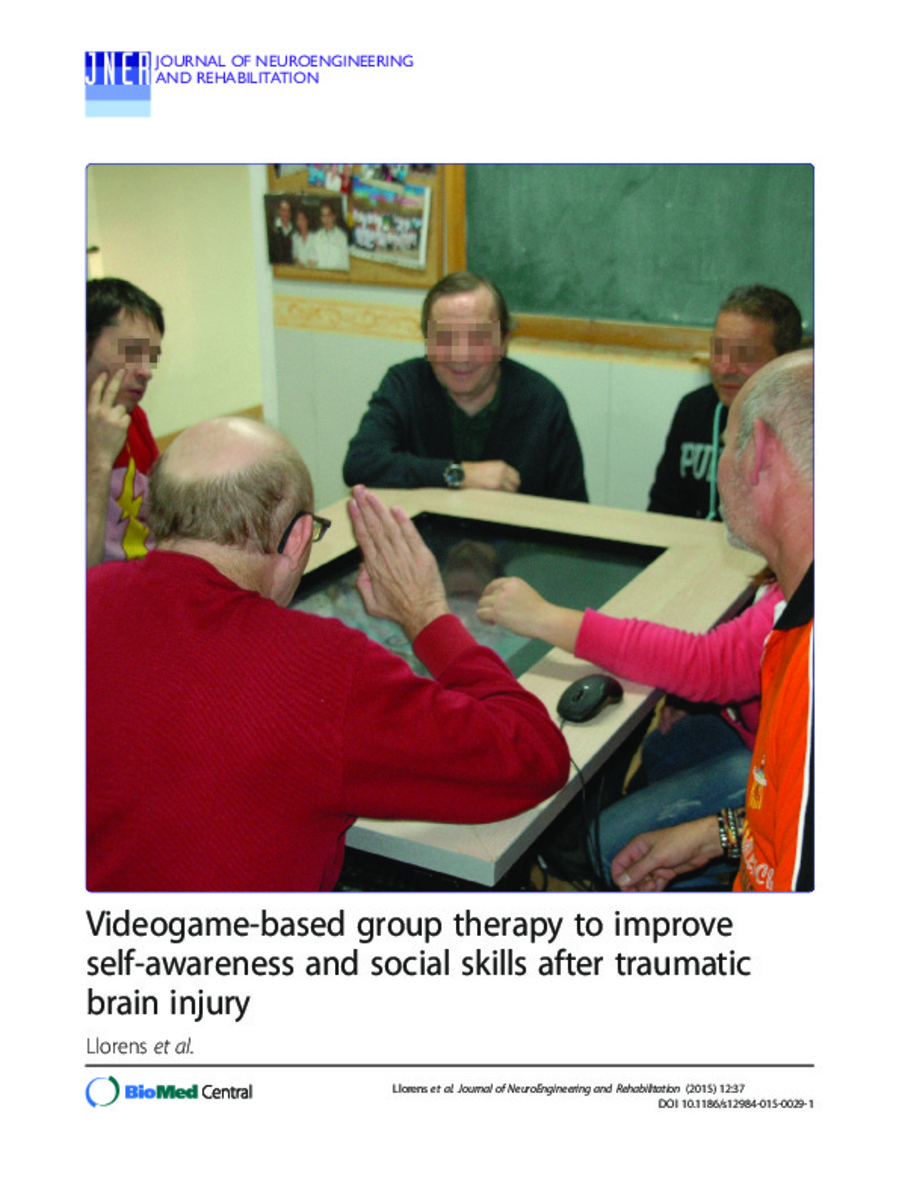Mostrar el registro sencillo del ítem
Videogame-based group therapy to improve self-awareness and social skills after traumatic brain injury
| dc.contributor.author | Llorens, Roberto | |
| dc.contributor.author | Noé, Enrique | |
| dc.contributor.author | Ferri, Joan | |
| dc.contributor.author | Alcañiz, Mariano | |
| dc.date.accessioned | 2017-10-25T12:30:10Z | |
| dc.date.available | 2017-10-25T12:30:10Z | |
| dc.date.issued | 2015-01 | |
| dc.identifier.citation | Llorens, R., Noé, E., Ferri, J., & Alcañiz, M. (2015). Videogame-based group therapy to improve self-awareness and social skills after traumatic brain injury. Journal of neuroengineering and rehabilitation, 12(1), 37. | ca_CA |
| dc.identifier.uri | http://hdl.handle.net/10234/169571 | |
| dc.description.abstract | Background: This study determines the feasibility of different approaches to integrative videogame-based group therapy for improving self-awareness, social skills, and behaviors among traumatic brain injury (TBI) victims and retrieves participant feedback. Methods: Forty-two adult TBI survivors were included in a longitudinal study with a pre- and post-assessments. The experimental intervention involved weekly one-hour sessions conducted over six months. Participants were assessed using the Self-Awareness Deficits Interview (SADI), Patient Competency Rating Scale (PCRS), the Social Skills Scale (SSS), the Frontal Systems Behavior Scale (FrSBe), the System Usability Scale (SUS). Pearson's chi-squared test (chi(2)) was applied to determine the percentage of participants who had changed their clinical classification in these tests. Feedback of the intervention was collected through the Intrinsic Motivation Inventory (IMI). Results: SADI results showed an improvement in participant perceptions of deficits (chi(2) = 5.25, p < 0.05), of their implications (chi(2) = 4.71, p < 0.05), and of long-term planning (chi(2) = 7.86, p < 0.01). PCRS results confirm these findings (chi(2) = 5.79, p < 0.05). SSS results were also positive with respect to social skills outcomes (chi(2) = 17.52, p < 0.01), and FrSBe results showed behavioral improvements (chi(2) = 34.12, p < 0.01). Participants deemed the system accessible (80.43 +/- 8.01 out of 100) and regarded the intervention as interesting and useful (5.74 +/- 0.69 out of 7). Conclusions: Integrative videogame-based group therapy can improve self-awareness, social skills, and behaviors among individuals with chronic TBI, and the approach is considered effective and motivating. | ca_CA |
| dc.format.extent | 9 p. | ca_CA |
| dc.format.mimetype | application/pdf | ca_CA |
| dc.language.iso | eng | ca_CA |
| dc.publisher | BioMed Central | ca_CA |
| dc.rights | © Llorens et al.; licensee BioMed Central. 2015 | ca_CA |
| dc.rights | Atribución 4.0 Internacional | * |
| dc.rights.uri | http://creativecommons.org/licenses/by-sa/4.0/ | * |
| dc.subject | Self-awareness | ca_CA |
| dc.subject | Social skills | ca_CA |
| dc.subject | Traumatic brain injury | ca_CA |
| dc.subject | Rehabilitation | ca_CA |
| dc.subject | Neuropsychology | ca_CA |
| dc.subject | Virtual reality | ca_CA |
| dc.title | Videogame-based group therapy to improve self-awareness and social skills after traumatic brain injury | ca_CA |
| dc.type | info:eu-repo/semantics/article | ca_CA |
| dc.identifier.doi | http://dx.doi.org/10.1186/s12984-015-0029-1 | |
| dc.relation.projectID | Ministerio de Economía y Competitividad of Spain (Project TEREHA, IDI-20110844; and NeuroVR, TIN2013-44741-R); Ministerio de Educación y Ciencia of Spain (Projects Consolider-C, SEJ2006-14301/PSIC; “CIBER of Physiopathology of Obesity and Nutrition, an initiative of ISCIII”); Excellence Research Program PROMETEO (Generalitat Valenciana. Conselleria de Educación, 2008–157) | ca_CA |
| dc.rights.accessRights | info:eu-repo/semantics/openAccess | ca_CA |
| dc.relation.publisherVersion | https://jneuroengrehab.biomedcentral.com/articles/10.1186/s12984-015-0029-1 | ca_CA |
| dc.type.version | info:eu-repo/semantics/publishedVersion | ca_CA |
Ficheros en el ítem
Este ítem aparece en la(s) siguiente(s) colección(ones)
-
PSB_Articles [1303]
Articles de publicacions periòdiques








